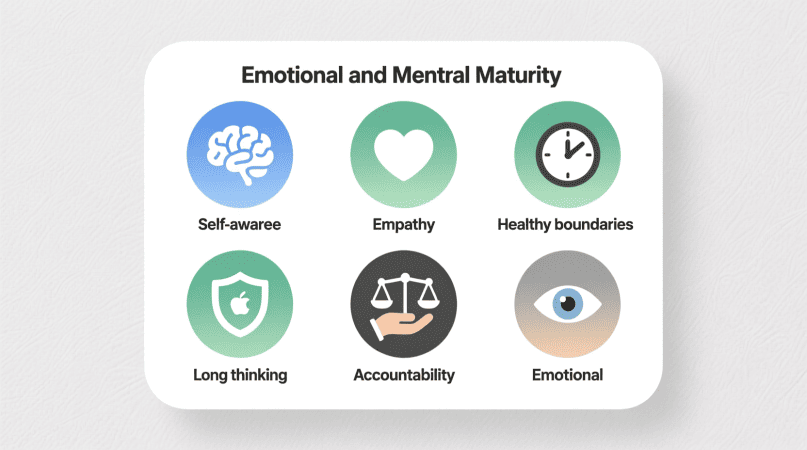
Getting older doesn’t always mean growing up. Some people age in years but still struggle with responsibility, while others show wisdom and balance far beyond their age. Emotional and mental maturity aren’t about birthdays—they’re about how you think, respond, and relate to the world.
If you’ve ever wondered, “Am I really mature?”, here are the most reliable signs that psychologists, coaches, and relationship experts look for.
Start with our mental age test free to see how emotionally and mentally mature your mindset really is.
Signs of Emotional and Mental Maturity
1. You Take Responsibility Instead of Shifting Blame
Mature people own their actions, even when it’s uncomfortable. Saying “I messed up, and here’s how I’ll fix it” builds trust and shows strength.
2. You Regulate Your Emotions
Feeling angry, jealous, or anxious is normal. What matters is whether you let those emotions control you. Maturity shows when you pause, breathe, and respond thoughtfully instead of reacting impulsively.
3. You Value Long-Term Growth Over Short-Term Pleasure
Choosing what benefits you tomorrow instead of only today—like saving money, committing to health, or working toward goals—is a clear sign of mental maturity.
4. You Can Empathize With Others
Emotional maturity is obvious when you truly listen and imagine what others are experiencing, even if you disagree.
5. You Handle Conflict Without Escalating It
Arguments become constructive when you seek solutions instead of “winning.” Mature people stay calm, respectful, and solution-focused.
6. You Accept Change and Uncertainty
Life rarely goes according to plan. Mentally mature people don’t panic when things shift—they adapt and keep moving forward.
7. You Set and Respect Boundaries
Being able to say no without guilt and respecting others’ boundaries is one of the clearest markers of emotional health.
8. You Learn From Past Mistakes
Immature minds repeat the same errors. Maturity means noticing patterns, adjusting, and not falling into the same traps again.
9. You Don’t Depend on Constant Validation
Likes, compliments, or external approval don’t define you. A mature person builds confidence from within.
10. You Balance Logic and Emotion in Decisions
Big life choices—career moves, relationships, finances—require both reason and empathy. Mature people don’t lean on one side alone.
11. You Stay Curious and Open to Growth
Even with experience, mentally mature people admit they don’t know everything. They ask questions, learn from others, and embrace growth.
12. You Respect Different Perspectives
Instead of dismissing others, you accept that people can see the world differently. Respect, even in disagreement, is a hallmark of maturity.
Read can maturity be measured with a test? to understand how assessments can reveal your growth level.
Why These Signs Matter
Recognizing emotional and mental maturity in yourself (or the lack of it) is valuable because it helps you:
- Build stronger, healthier relationships.
- Make smarter, long-term decisions.
- Reduce unnecessary stress and drama.
- Grow into a calmer, wiser version of yourself.
Quick Self-Check: Are You Showing These Signs?
- Do you pause before reacting in tough situations?
- Do you accept responsibility when you’re wrong?
- Do you choose what’s right over what’s easy?
- Do you respect other people’s boundaries and perspectives?
If you answered yes to most of these, you’re already showing strong maturity. If not, that’s not failure—it’s a starting point for growth.
See how your mindset compares across different life stages with our comparison guide.
FAQs
Q: What’s the difference between emotional and mental maturity?
Emotional maturity is about handling feelings and relationships, while mental maturity focuses on judgment, reflection, and long-term thinking.
Q: Can maturity grow over time?
Yes. Experience, reflection, and conscious effort all strengthen maturity.
Q: Are there tests for maturity?
Yes. Tools like an emotional age test can give quick insights, while professional assessments go deeper.
- A deeper explanation of these traits appears in signs of emotional and mental maturity.
- How maturity develops over time is outlined in emotional maturity.
- Differences between emotional and thinking styles are compared in mental age vs emotional age.
- You can reflect on your own maturity level with the mental age test.
- How maturity influences choices is explained in mental age and decision making.
- Practical ways to grow are shared in how to improve mental age.